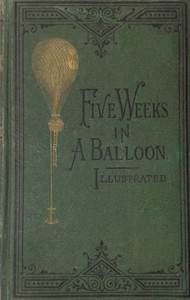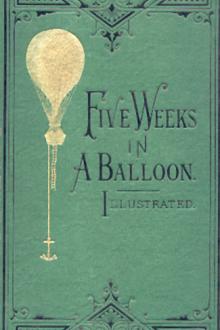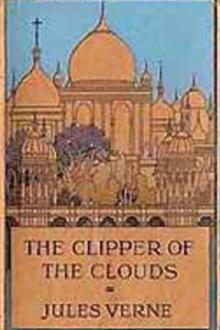Five Weeks in a Balloon<br />Or, Journeys and Discoveries in Africa by Three Englishmen, Jules Verne [english novels to read txt] 📗

- Author: Jules Verne
Book online «Five Weeks in a Balloon<br />Or, Journeys and Discoveries in Africa by Three Englishmen, Jules Verne [english novels to read txt] 📗». Author Jules Verne
At the height of six thousand feet, the density of the atmosphere has already greatly diminished; sound is conveyed with difficulty, and the voice is not so easily heard. The view of objects becomes confused; the gaze no longer takes in any but large, quite ill-distinguishable masses; men and animals on the surface become absolutely invisible; the roads and rivers get to look like threads, and the lakes dwindle to ponds.
The doctor and his friends felt themselves in a very anomalous condition; an atmospheric current of extreme velocity was bearing them away beyond arid mountains, upon whose summits vast fields of snow surprised the gaze; while their convulsed appearance told of Titanic travail in the earliest epoch of the world’s existence.
The sun shone at the zenith, and his rays fell perpendicularly upon those lonely summits. The doctor took an accurate design of these mountains, which form four distinct ridges almost in a straight line, the northernmost being the longest.
The Victoria soon descended the slope opposite to the Rubeho, skirting an acclivity covered with woods, and dotted with trees of very deep-green foliage. Then came crests and ravines, in a sort of desert which preceded the Ugogo country; and lower down were yellow plains, parched and fissured by the intense heat, and, here and there, bestrewn with saline plants and brambly thickets.
Some underbrush, which, farther on, became forests, embellished the horizon. The doctor went nearer to the ground; the anchors were thrown out, and one of them soon caught in the boughs of a huge sycamore.
Joe, slipping nimbly down the tree, carefully attached the anchor, and the doctor left his cylinder at work to a certain degree in order to retain sufficient ascensional force in the balloon to keep it in the air. Meanwhile the wind had suddenly died away.
“Now,” said Ferguson, “take two guns, friend Dick—one for yourself and one for Joe—and both of you try to bring back some nice cuts of antelope-meat; they will make us a good dinner.”
“Off to the hunt!” exclaimed Kennedy, joyously.
He climbed briskly out of the car and descended. Joe had swung himself down from branch to branch, and was waiting for him below, stretching his limbs in the mean time.
“Don’t fly away without us, doctor!” shouted Joe.
“Never fear, my boy!—I am securely lashed. I’ll spend the time getting my notes into shape. A good hunt to you! but be careful. Besides, from my post here, I can observe the face of the country, and, at the least suspicious thing I notice, I’ll fire a signal-shot, and with that you must rally home.”
“Agreed!” said Kennedy; and off they went.
The Forest of Gum-Trees.—The Blue Antelope.—The Rallying-Signal.—An Unexpected Attack.—The Kanyemé.—A Night in the Open Air.—The Mabunguru.—Jihoue-la-Mkoa.—A Supply of Water.—Arrival at Kazeh.
The country, dry and parched as it was, consisting of a clayey soil that cracked open with the heat, seemed, indeed, a desert: here and there were a few traces of caravans; the bones of men and animals, that had been half-gnawed away, mouldering together in the same dust.
After half an hour’s walking, Dick and Joe plunged into a forest of gum-trees, their eyes alert on all sides, and their fingers on the trigger. There was no foreseeing what they might encounter. Without being a rifleman, Joe could handle fire-arms with no trifling dexterity.
“A walk does one good, Mr. Kennedy, but this isn’t the easiest ground in the world,” he said, kicking aside some fragments of quartz with which the soil was bestrewn.
Kennedy motioned to his companion to be silent and to halt. The present case compelled them to dispense with hunting-dogs, and, no matter what Joe’s agility might be, he could not be expected to have the scent of a setter or a greyhound.
A herd of a dozen antelopes were quenching their thirst in the bed of a torrent where some pools of water had lodged. The graceful creatures, snuffing danger in the breeze, seemed to be disturbed and uneasy. Their beautiful heads could be seen between every draught, raised in the air with quick and sudden motion as they sniffed the wind in the direction of our two hunters, with their flexible nostrils.
Kennedy stole around behind some clumps of shrubbery, while Joe remained motionless where he was. The former, at length, got within gunshot and fired.
The herd disappeared in the twinkling of an eye; one male antelope only, that was hit just behind the shoulder-joint, fell headlong to the ground, and Kennedy leaped toward his booty.
It was a blauwbok, a superb animal of a pale-bluish color shading upon the gray, but with the belly and the inside of the legs as white as the driven snow.
“A splendid shot!” exclaimed the hunter. “It’s a very rare species of the antelope, and I hope to be able to prepare his skin in such a way as to keep it.”
“Indeed!” said Joe, “do you think of doing that, Mr. Kennedy?”
“Why, certainly I do! Just see what a fine hide it is!”
“But Dr. Ferguson will never allow us to take such an extra weight!”
“You’re right, Joe. Still it is a pity to have to leave such a noble animal.”
“The whole of it? Oh, we won’t do that, sir; we’ll take all the good eatable parts of it, and, if you’ll let me, I’ll cut him up just as well as the chairman of the honorable corporation of butchers of the city of London could do.”
“As you please, my boy! But you know that in my hunter’s way I can just as easily skin and cut up a piece of game as kill it.”
“I’m sure of that, Mr. Kennedy. Well, then, you can build a fireplace with a few stones; there’s plenty of dry dead-wood, and I can make the hot coals tell in a few minutes.”
“Oh! that won’t take long,” said Kennedy, going to work on the fireplace, where he had a brisk flame crackling and sparkling in a minute or two.
Joe had cut some of the nicest steaks and the best parts of the tenderloin from the carcass of the antelope, and these were quickly transformed to the most savory of broils.
“There, those will tickle the doctor!” said Kennedy.
“Do you know what I was thinking about?” said Joe.
“Why, about the steaks you’re broiling, to be sure!” replied Dick.
“Not the least in the world. I was thinking what a figure we’d cut if we couldn’t find the balloon again.”
“By George, what an idea! Why, do you think the doctor would desert us?”
“No; but suppose his anchor were to slip!”
“Impossible! and, besides, the doctor would find no difficulty in coming down again with his balloon; he handles it at his ease.”
“But suppose the wind were to sweep it off, so that he couldn’t come back toward us?”
“Come, come, Joe! a truce to your suppositions; they’re any thing but pleasant.”
“Ah! sir, every thing that happens in this world is natural, of course; but, then, any thing may happen, and we ought to look out beforehand.”
At this moment the report of a gun rang out upon the air.
“What’s that?” exclaimed Joe.
“It’s my rifle, I know the ring of her!” said Kennedy.
“A signal!”
“Yes; danger for us!”
“For him, too, perhaps.”
“Let’s be off!”
And the hunters, having gathered up the product of their expedition, rapidly made their way back along the path that they had marked by breaking boughs and bushes when they came. The density of the underbrush prevented their seeing the balloon, although they could not be far from it.
A second shot was heard.
“We must hurry!” said Joe.
“There! a third report!”
“Why, it sounds to me as if he was defending himself against something.”
“Let us make haste!”
They now began to run at the top of their speed. When they reached the outskirts of the forest, they, at first glance, saw the balloon in its place and the doctor in the car.
“What’s the matter?” shouted Kennedy.
“Good God!” suddenly exclaimed Joe.
“What do you see?”
“Down there! look! a crowd of blacks surrounding the balloon!”
And, in fact, there, two miles from where they were, they saw some thirty wild natives close together, yelling, gesticulating, and cutting all kinds of antics at the foot of the sycamore. Some, climbing into the tree itself, were making their way to the topmost branches. The danger seemed pressing.
“My master is lost!” cried Joe.
“Come! a little more coolness, Joe, and let us see how we stand. We hold the lives of four of those villains in our hands. Forward, then!”
They had made a mile with headlong speed, when another report was heard from the car. The shot had, evidently, told upon a huge black demon, who had been hoisting himself up by the anchor-rope. A lifeless body fell from bough to bough, and hung about twenty feet from the ground, its arms and legs swaying to and fro in the air.
“Ha!” said Joe, halting, “what does that fellow hold by?”
“No matter what!” said Kennedy; “let us run! let us run!”
“Ah! Mr. Kennedy,” said Joe, again, in a roar of laughter, “by his tail! by his tail! it’s an ape! They’re all apes!”
“Well, they’re worse than men!” said Kennedy, as he dashed into the midst of the howling crowd.
It was, indeed, a troop of very formidable baboons of the dog-faced species. These creatures are brutal, ferocious, and horrible to look upon, with their dog-like muzzles and savage expression. However, a few shots scattered them, and the chattering horde scampered off, leaving several of their number on the ground.
In a moment Kennedy was on the ladder, and Joe, clambering up the branches, detached the anchor; the car then dipped to where he was, and he got into it without difficulty. A few minutes later, the Victoria slowly ascended and soared away to the eastward, wafted by a moderate wind.
“That was an attack for you!” said Joe.
“We thought you were surrounded by natives.”
“Well, fortunately, they were only apes,” said the doctor.
“At a distance there’s no great difference,” remarked Kennedy.
“Nor close at hand, either,” added Joe.
“Well, however that may be,” resumed Ferguson, “this attack of apes might have had the most serious consequences. Had the anchor yielded to their repeated efforts, who knows whither the wind would have carried me?”
“What did I tell you, Mr. Kennedy?”
“You were right, Joe; but, even right as you may have been, you were, at that moment, preparing some antelope-steaks, the very sight of which gave me a monstrous appetite.”
“I believe you!” said the doctor; “the flesh of the antelope is exquisite.”
“You may judge of that yourself, now, sir, for supper’s ready.”
“Upon my word as a sportsman, those venison-steaks have a gamy flavor that’s not to be sneezed at, I tell you.”
“Good!” said Joe, with his mouth full, “I could live on antelope all the days of my life; and all the better with a glass of grog to wash it down.”
So saying, the good fellow went to work to prepare a jorum of that fragrant beverage, and all hands tasted it with satisfaction.
“Every thing has gone well thus far,” said he.
“Very well indeed!” assented Kennedy.
“Come, now, Mr. Kennedy, are you sorry that you came with us?”
“I’d like to see anybody prevent my coming!”
It was now four o’clock in the afternoon. The Victoria had struck a more rapid current. The face of the country was gradually rising, and, ere long, the barometer indicated a height of fifteen hundred feet above the level of the sea. The doctor was, therefore, obliged to keep his balloon up by a quite considerable dilation of gas, and the cylinder was hard at work all the time.
Toward seven o’clock, the balloon was sailing over the basin of Kanyemé. The doctor immediately recognized that immense clearing, ten miles in extent, with its villages buried in the midst of baobab and calabash trees. It is the residence of one of the sultans of the Ugogo country, where civilization is, perhaps, the least backward. The natives there are less addicted to selling members of their own families, but still, men and animals all live together in round huts, without frames, that look like haystacks.
Beyond Kanyemé the soil becomes arid and stony, but in an hour’s journey, in a fertile dip of the soil, vegetation had resumed all its vigor at some distance from Mdaburu. The wind fell with the close of the day, and the atmosphere seemed to sleep. The doctor vainly sought for a current of air at different heights, and, at last, seeing this calm of all nature, he resolved to pass the night afloat, and, for greater safety, rose to the height of one thousand feet, where the balloon remained motionless. The night was magnificent, the heavens glittering with stars, and profoundly silent in the upper air.
Dick and Joe stretched





Comments (0)